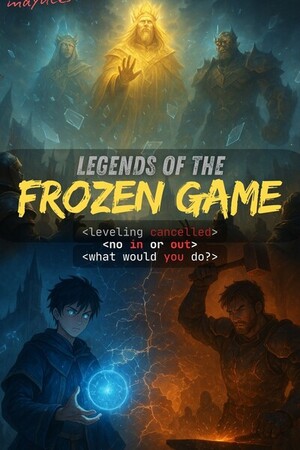Chapter 17:
Interlude: Emberglass Balcony — After the Trial
Emberglass Oath
The wind above the city carried heat like a quiet aftershock. Arata stood with his palms on the emberglass rail, feeling the faint thrum—like a heartbeat trapped inside crystal. Below: two days. Above: two hundred. Time split along a seam only he could see.
He had won the Trial. That was the word others would use. Victory, as if the arena had given him a medal instead of a mirror. It had shown him his own intent—bare, unarmored—and demanded a price for every future he thought he wanted.
He let his Draconic Eyes soften until the city blurred. The world slowed when he sharpened them; when he let them relax, the world felt mercifully ordinary. For the first time since he arrived, he allowed ordinary to exist. Breathing. Counting the beats.
A door clicked behind him. Lyriel said nothing at first. She understood the ritual of silence better than any prayer. The balcony held three voices anyway: the wind, the emberglass, and the thought he had not named. She leaned on the rail a pace away, gaze on the horizon where Caelestia’s towers folded the light.
'You didn’t use all the speed you had,' she said at last.
'It wasn’t a test of speed.'
'No. It was a test of restraint.' A faint smile. 'Orvos will call it discipline. Selestia will call it governance. Kael will call it posture. I call it survival. You have the kind of power that gets people killed when it goes the wrong direction.'
He almost laughed. 'I thought power saves people.'
'It can. But only if you survive your own reflection.' She tapped the rail. 'What did you see?'
He considered lying. He considered saying he had seen a monster and triumphed, because victory makes a cleaner story than compromise. 'I saw what my anger thinks I am allowed to do,' he said. 'And how easy it would be to call it justice.'
'Good,' Lyriel replied. 'That is the first honest sentence you have spoken since you left the arena.'
They watched the cloud layer peel open for a ray of afternoon sun. It struck the emberglass and turned the balcony into a page of living fire. He remembered the street—the kneeling, the spitting, the fear. The way eyes changed when they decided you were no longer 'one of us.' He remembered Aris’s voice, steady over a crowd that wanted anything but steady.
'I can slow the world,' he said, 'but I can’t make it kinder.'
'Then make it clearer,' Lyriel said. 'Clarity is the first kindness.'
He breathed again, deeper, letting the slow return. When the Draconic Eyes yielded, the sound of the city came back in threads—vendors hawking broth, cables singing in the wind, a child laughing because the sky made a new shape out of light. He gripped the rail once more and thought of the promise he had made without saying it aloud.
'I’ll stay,' he whispered—not to Lyriel, who already knew, but to the city. 'I’ll do it.'
Lyriel shifted. 'Then start by naming what you will not do.'
He turned. 'I won’t trade one terror for another. Not in the streets. Not in the Council. Not in myself.'
'Good,' she said again. 'Now you are almost ready to learn how to leave a room before you set it on fire.'
He blinked. 'That’s… a lesson?'
'Everything is a lesson here. Even the wind.' She pushed off the rail. 'Orvos will be waiting. So will Selestia. And the city will keep taking the measure of you. Let it. That is how trust starts—slowly, and then all at once.'
When she left, the balcony kept the conversation for a while longer. Arata traced a fingertip along a hairline fracture in the emberglass—nothing structural, just a memory of heat from some prior siege. He understood. Strength was not the absence of stress. It was the record of how you carried it.
Below: two days. Above: two hundred. He would have to live both honestly. He set his hands to the rail, and for the first time the city felt a little closer, as if it had moved a fraction of an inch toward him.
***
Aris found him not on the balcony but among the suspended walkways that stitched one tower to the next. The air smelled faintly of ozone and boiling broth; somewhere a cable thrummed a scale, windbow on steel.
'You keep choosing high ground,' she said by way of greeting.
'Hard to see the shape of things from the ground,' he answered.
'Harder to hear them,' Aris replied. She matched his stride. Burned leather, scuffed pauldrons, the habit of someone who had worn more armor than ceremony. 'The Council wants a statement. They want you to say the right sentence in the right room so they can file it in the right drawer.'
'And you?'
'I want you to keep yesterday from happening again. The city can live with fear. It dies of boredom. Yesterday was neither fear nor boredom. It was a rehearsal.'
'For whom?'
'For anyone who wants to turn us against ourselves,' Aris said. 'That includes whatever wears the Crown. But it also includes people who like the sound of their own certainty.'
They paused where the walkway widened to a hexagon of glass. Caelestia churned beneath: the markets, the tramlines, the lanterns that woke early. Arata saw himself reflected—in halves, then thirds—across the glass facets. He looked like a question with too many answers.
'You didn’t kneel,' he said.
'I don’t kneel to crowds,' Aris replied. 'Crowds have bad memory.' She studied him. 'What do you need from me?'
'I need to stop making the same mistake,' he said. 'When I move, the world slows. When I speak, it doesn’t. I choose wrong which one to trust.'
'Then don’t choose,' Aris said. 'Borrow both. Let speed buy you the second thought your mouth refuses to wait for. Let speech buy you the grace to not use your hands.'
He frowned. 'Wisdom by paradox.'
'By practice.' She angled her chin toward the far span. 'Come on. The Archives.'
The Archives occupied a ring two levels below Council chambers: shelves like ribs, scrolls and glass-slates; a quiet that made every footfall a decision. Aris led him past the public stacks to a door guarded by a tangle of sigils. They flickered when his Draconic Eyes noticed them—layers of timing, keyed to breath and pulse.
'We keep records of what we endure,' Aris said. 'Not to weaponize memory. To make it weigh correctly.'
Inside, the light dimmed to a careful dusk. She set a slate on the table and brushed her thumb across it. A map unfolded: Caelestia as lattice. Nodes glowed. Threads pulsed.
'Incidents in the last seven days,' Aris said. 'Small. Precise. Someone is teaching the city to flinch in symmetrical places.'
'Teaching who?'
'Everyone,' she said. 'Flinching is contagious. So is blame.' She pulled a second layer into view: reports of whispers, wrong uniforms, gossip that arrived too fast for news. 'I can hold a crowd, Arata. I cannot be everywhere. I need you to be exactly where you should be before anyone knows you should be there.'
He studied the map, letting the Draconic Eyes carry him across it—time flattening into a sheet of causality. 'If I move now,' he said, 'I arrive before the rumor does.'
'Good. Then talk first,' Aris said. 'Make clarity boring. Monsters dislike boredom.'
He almost smiled. 'And if it’s not a rumor?'
'Then you do what you were made to do,' Aris replied, 'without becoming the reason we lose ourselves.'
He nodded. The map reassembled into the city he could walk. For a moment he saw, not a battlefield, but a pattern he could keep from tearing. 'What do you need me to say to the Council?'
'Tell them the truth in a sentence they’ll remember by accident: We will not trade one terror for another.'
'That’s your line,' he said.
'It’s the city’s line. I’m just delivering it ahead of time.' She slid the slate back into its sheath. 'There’s one more thing you should know.'
They stopped before a case that held a single artifact: an old visor, glass smoked and spidered. A placard read: 'Recovered after the Siege of the Seventh Span.'
'Someone else wore eyes like yours once,' Aris said. 'He saved a district. He also broke three others in the process. We do not remember him as monster or saint. We remember the weight we had to carry after him.'
Arata met his own reflection in the ruined visor. 'Then remember me as the one who learned from that weight.'
'That will do,' Aris said. 'For now, stop a rumor. Then stop a rehearsal.'
When they left the Archives, the cable-song had shifted key. Vendors had changed their calls. Somewhere a child was still laughing. The city lived—untidy, contradictory, itself.
On the span outside, Aris halted. 'One last instruction. When you feel the urge to break something in order to prove you can—leave the room.'
He breathed once, twice. 'I’ll try.'
'Try slower,' Aris said, and let the walkway take her away.




Please sign in to leave a comment.